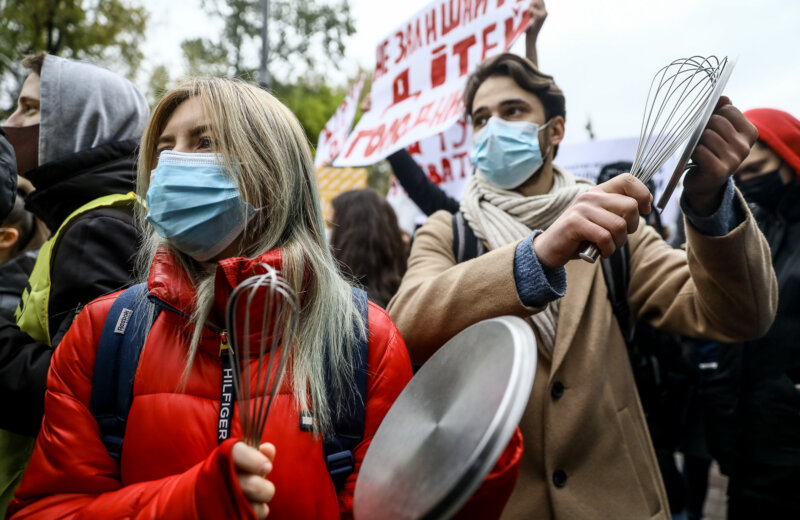Ukrainian businesses have gone through it all during the COVID‑19 pandemic — and many are still standing. But with new restrictions in place, the question many owners have is: For how long?
First, they were forced to shut down during a harsh quarantine imposed by the government in March. Then, as lockdown conditions eased in May, they adapted their service by adopting new safety requirements. Those included physical distancing, a mask-on policy, providing employees with sanitizers and protective gear and making food delivery safe. Restaurants got some summer relief with outside terraces. But, amid the onset of cold weather, the less safe and less popular option of dining indoors is adding new financial perils.
And now, a weekend lockdown that took effect on Nov. 14 has delivered another tough blow, forcing non-essential businesses to close at least through the end of November. Restaurants are only allowed to provide takeaway and delivery options.
As Ukraine routinely sets new infection records, the weekend lockdown — or even tougher measures — are expected to last through the winter holidays. Protests outside of the Cabinet of Ministers have had no effect. Some enterprises ignored the government edicts, prompting police to fine and shut down 2,400 of them during the first weekend. The following weekend, Nov. 21–22, more than 1,300 companies shut down.
While quick to punish violators, the authorities have been slow to help the struggling sector. President Volodymyr Zelensky recently announced a plan for compensating some self-employed entrepreneurs and employees. But the meager payments of Hr 8,000 ($280) are hardly enough.
How to survive?
To survive, the owners of Veterano Brownie, a coffee shop and brownie bakery in the capital’s Podil district, offered free delivery and involved the entire staff during the spring lockdown. Owners Julia Kochetova-Nabozhniak and Roman Nabozhniak say that loyal customers helped them survive back then. “We do not plan layoffs. Our team is a key priority,” Kochetova-Nabozhniak told the Kyiv Post.
But finances suffered greatly. Delivery and takeout require more spending on transportation and packaging. The owners, moreover, are still paying off loans used for the café’s launch in 2019.
Veterano Brownie owners prefer a full lockdown over a weekend one. A full lockdown triggers the force majeure clause in many agreements, allowing entrepreneurs to defer lease and loan payments.
Still, in November, the cafe is better prepared for disruptions. It introduced a new menu item: brownie in a jar. The dessert is made of trimmed edges of brownies, cream and salted caramel. It can be frozen and stored for up to 30 days. “This is also a way to reduce food waste,” Kochetova-Nabozhniak says.
The entrepreneurs were again surprised by the loyalty of Kyiv residents. “At first, we thought that one person by the bar would be enough to serve over the weekend, but our guests supported us so much that we’re having a full shift staff starting from the second weekend,” Kochetova-Nabozhniak says.
Now the café is offering a 30% discount on Black Friday. They are also introducing corporate gift options for the upcoming winter holiday season.

Kyiv’s HVLV bar, which normally holds parties on Saturday and Sunday, is losing about 60% of their regular revenue because of the “weekend lockdown” measure that came into force on Nov. 14. (Volodymyr Petrov)
Frozen nightlife
The situation is worse for clubs and bars, which need weekend patronage to thrive. For Kyiv’s HVLV bar (pronounced “Khvylovy”), a weekend lockdown is almost as damaging as a full one. “The weekend quarantine skewed our sales by about 60%,” co-founder Andy Yankovskyi told the Kyiv Post.
The abruptness — approved just three days before coming into force — left no time to prepare. “It’s all very stressful because you don’t know what new trick the Cabinet will play tomorrow, shooting point-blank without warning,” Yankovskyi says.
Yankovskyi would also prefer a full lockdown for the chance to postpone payments to suppliers.
HVLV did not lay off any employees yet, but cut managers’ salaries by 10%. “We have a very strong and friendly team, in which we have invested a lot of time and effort, and we would like to keep it,” Yankovskyi says.
The first harsh lockdown in March pushed HVLV to launch delivery, mostly consisting of their specialty drinks. But that wasn’t much of a success. “A bar is a place where people come exclusively for the bar magic, which takes place behind the counter when a bartender is making your drink,” Yankovskyi says.
This time, HVLV has improved the delivery menu, adding many food options. Now, there’s a variety of sandwiches, bowls, soups, hummus, as well as 15 signature cocktails, lemonade and other drinks.
But the owners don’t count on more than covering salaries for employees.
Cinemas in debt
Unlike restaurants and bars, cinemas were left with no options on the weekend.
Since the start of the pandemic, theaters have had to reduce the number of seats at screenings to ensure adequate distance between moviegoers. Many big premieres that were supposed to attract bigger audiences have also been canceled. The business has suffered enormously.
One of Ukraine’s largest cinema chains, Planeta Kino, is having trouble making ends meet, going deeper into debt. The company has nine cinemas in six Ukrainian cities. The weekend lockdown will cost them 70–80% of all revenue.
“We cannot pay rent for all our premises now,” co-owner of Planeta Kino Dmytro Derkach told the Kyiv Post.
The company reduced shifts and cut salaries by 50% for employees of the central Kyiv office and the management team. Some quit.
In the worst-case scenario, Planeta Kino will have to shut down all cinemas and lay off more than 500 employees and wait until mass vaccination brings life back to normal.
“We work with huge losses and in this case, we will not last long,” Derkach says.



